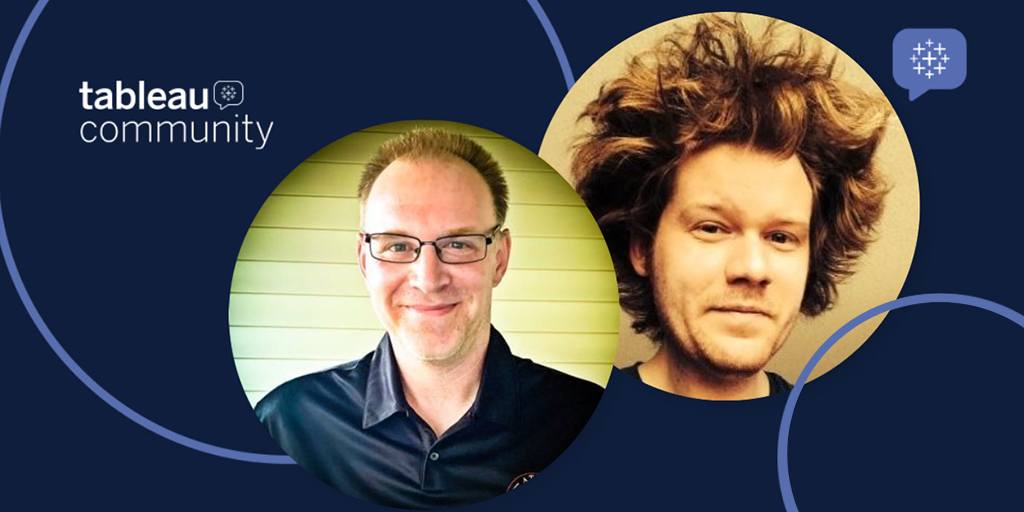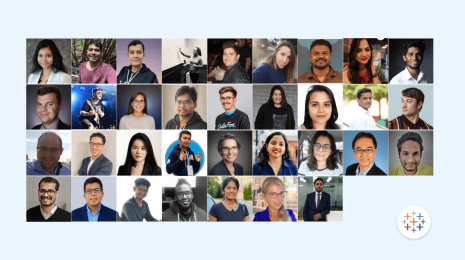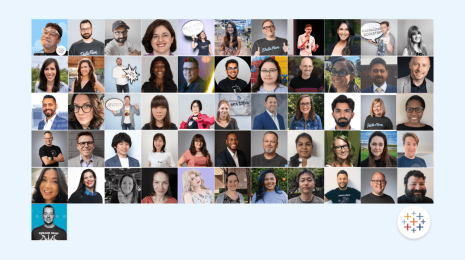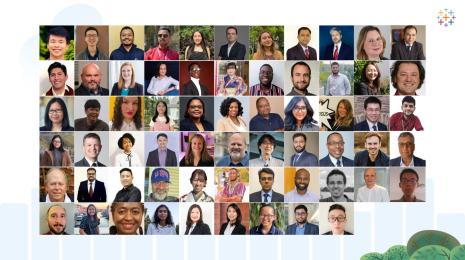Neurodiversity and Data: A conversation with Adam Mico and Hunter Hansen
 I had a chance to talk with Adam Mico and Hunter Hansen shortly after their presentation on neurodiversity at the The Fringe Festival. The Fringe Festival is a community organized event to give people a platform who may not have opportunities to participate in mainstream circuits. Anyone who knows Adam and Hunter knows that they are very active within the data community. They are both data visualization and analytics professionals by day who are also neurodiversity advocates by life. Neurodiversity is a viewpoint that brain differences are normal rather than deficits. The idea of neurodiversity can reduce the stigma with learning and thinking differences. It can help frame challenges as differences, rather than as deficits. It can also shed light on instructional approaches that might help to highlight particular strengths neurodiverse individuals have.
I had a chance to talk with Adam Mico and Hunter Hansen shortly after their presentation on neurodiversity at the The Fringe Festival. The Fringe Festival is a community organized event to give people a platform who may not have opportunities to participate in mainstream circuits. Anyone who knows Adam and Hunter knows that they are very active within the data community. They are both data visualization and analytics professionals by day who are also neurodiversity advocates by life. Neurodiversity is a viewpoint that brain differences are normal rather than deficits. The idea of neurodiversity can reduce the stigma with learning and thinking differences. It can help frame challenges as differences, rather than as deficits. It can also shed light on instructional approaches that might help to highlight particular strengths neurodiverse individuals have.
In “Neurodiversity and Data,” Hunter discusses that the qualities of good design are intuitive, accessible and unobtrusive. He explains that while neurodivergent people can be hyper focused and excel at pattern recognition, dashboard layouts should not be cluttered for example. They should be clear, concise and consistent.
Adam discusses autism myth busters that debunk the theory that autistic people can’t navigate, thrive or contribute to a community. In “The DataFam and Autism: A Match Made in Data'' he describes how the DataFam is focused on supporting Tableau users and deliberately inclusive. He encourages austistic people to create either a free Tableau Public profile to start vizzing or a data viz blog to start writing and sharing ideas. Both of these activities will help newcomers engage with the tight knit community!
In our discussion, Adam and Hunter talk about data visualization and why it appeals to neurodivergent audiences as well as tips to make dashboards less distracting and user friendly. They also share their autism journeys and how engaging communities have been fulfilling to them.
Allen Hillery (AH): Can you share your thoughts on why data visualization appeals to neurodivergent people?
Adam Mico (AM): Data visualization provides options and context that's missing from tables or paragraphs while allowing me the option to find my own way with data. A lot of words are very difficult for many neurodivergent people to wrap their heads around and get meaning. From my personal experience, I very much prefer to find something at a high level and if interested have the ability to do a deep dive.
Hunter Hansen (HH):I feel it helps engage and translate what is often a difficult field for some, many neurodivergent individuals, especially those who fall under the dyscalculia umbrella. Dyscalculia is a learning disability that impairs an individual's ability to learn number related concepts and basic math skills. Even those who are adept in data, numbers, maths find a certain stimuli in "visualizing" numbers, like it takes it out of the mechanical discipline into something more creative, shapely.
AH: I got a sense from watching both of your presentations that there is something particular about Tableau that appeals to neurodivergent users. Can you elaborate on that?
AM: We tend to find something we like and get completely absorbed in it. Tableau as a tool provides nearly infinite ways to be absorbed with so many chart types to create and data to explore. It provides the ability to put those capabilities into practice and appear to be a data rockstar. In all, it gave me something that I was good at. It was easier to communicate what I held internally, and help others make informed decisions.
HH: For me, it's not just the versatility, but also the purpose. This is a dataviz design tool, not just a reporting tool with dataviz capability. It goes from the simple to the complex, and it feels like you can hyper focus on the deeper and complicated aspect to "scratch that proverbial itch" in a way.
AH: Do you feel Tableau's product design and user experience play a role in making it more appealing to neurodivergent communities?
AM: The product design of Tableau when I started; especially in the server environment was not as fun as it is today. Today, there are a lot of things that make it more user friendly in many environments. What I like is the user experience and being a good communicative tool. An additional benefit is seeing people get geeked out by data and its possibilities that were once afraid to open up an Excel document.
HH: Those aren't things that come to mind for me, despite both being good.
AH: Adam, you discuss in your presentation that you've been diagnosed as autistic for 10 years now. How was life for you prior to your diagnosis?
AM: Before I was diagnosed as autistic, I was aware on some level for most of my existence that my wavelength did not match others. When I was a kid in the 1980s in the Midwest, the only material I remember on autism is a film on a severely disabled person who stimmed at a very intense level. It really stigmatized my perceptions of being autistic and I didn't think of it for a long time. I just did my own thing while obsessing about fitting in and wondering why I didn't until I learned how to mask.
I focused on masking a lot in my early teens and fine-tuned it for years. I went on to college, got married and started a family. Eventually, I was unable to maintain the facade I had built and didn’t know how to cope. Not knowing how to deal with what I was struggling with and not wanting to alienate my wife and son, I started researching online to find answers.
I took an online test that said I was possibly autistic and my childhood vision of the severely disabled kid came back. I didn't deal with it for a couple more years, but not dealing with it made me care less about masking and hurt me personally and professionally more. I took a few more detailed tests online that made me realize it was a possibility, but I wasn't ruling out other conditions that were related. I went to seek a professional opinion that made the initial preliminary Aspergers diagnosis but referred me to a specialist who was working with DSM V where Aspergers was no longer a diagnosis and at that point was diagnosed with an Autism Spectrum Disorder with related anxiety. Learning that, more than any subsequent counseling, helped me better navigate the good and bad of having autism.
AH: What did you learn from this journey leading to your diagnosis?
AM: The worst issue relating to autism for me was the anxiety; when my anxiety kicks in, I can't mask and get angry. Knowing that I am autistic, understanding its anxiety and autistic lull triggers helps reduce their frequency and deal with it better once those issues return. If you think you may be autistic, I would encourage you to seek a diagnosis regardless of age. Even if you turn out to have a different condition, it's best to gain that data in order to avoid flailing at an invisible 'enemy'.
AH: Hunter, If I recall you found out earlier in life about being autistic. How did that influence your life journey and help you navigate?
HH: Regrettably, I spent more time masking and dampening my autistic attributes to "fit in" and navigate my social and professional circles. It was like wearing this suit of armor that looked like a "normal human." It was clunky, and I found in time that where I could be more "me," I was happier.
If anything, my navigation is a cautionary tale of skill acquisition in a guise of slight inauthenticity. I've since changed, and I'm looking to embrace where I can still grow and build myself as a more vibrantly autistic person.
AH: It seems like you both engage the community through blogs and videos. Hunter, you have a YouTube Channel, The Life Autistic where you have produced numerous videos on day to day life being autistic which I have learned a lot from. Adam, you have a weekly blog on Medium where you engage people in the datasphere and share about things that interest you.
Can you both share how important it is to engage the community? How has that impacted you and your audiences?
AM: In my experience, it's very difficult to have the desire to engage unless I am all in. Oftentimes, it takes reviewing the community and what it's about and testing the water. It's hard as an autistic to feel like you are not an outsider. Learning I can function, without a lot of exhausting effort in any community is groundbreaking for me in my 45 years. My engagement in the community is a little like learning how to ride a bike at 45 and not having to use training wheels. With that, on a personal level, it's everything.
HH: The way I look at it, I'm sharing my life experience and it's being interpreted as expertise. Somehow the two intertwine in ways I wasn't expecting. In "putting myself out there," I've found that the vulnerability in being autistic and neurodivergent has confirmed and affirmed in others that they are not alone, that they're not broken, and has shown me ways where my own experience resonates and helps others. It reflects back on me too and helps me absorb some of the gratefulness in my own life.
AM: Before our community, I always put in my head, no matter how down I was, that I just needed one good thing to look forward to. With our community, I'm cascaded by things that cheer me up -- it's unavoidable. As far as audiences are concerned, I never really set out to have a lot of followers or people looking forward to something I did. I just wanted to help others have an opportunity to shine and have the spotlight. It’s genuinely surprised me how brightly it glared back.
HH: As far as the data community is concerned, they're also a great convergence of authenticity and honesty. My work life and data life is my autistic life, and the echoes seem to carry with plenty those willing to share their unvarnished selves, irrespective of neurotypicality or atypicality. It's given me a bit more confidence to share my autistic self, which seems to be doing the same in others too. Even if it doesn't elicit the same from others, it helps act as a professional bridge, opening the paths to seeing similar neurodivergent traits in others, from which acceptance and appreciation follows.
AH: How do you feel your engagement has shed light on the neuro-divergent community?
AM: As far as being neurodivergent in our community; I owe a lot to being free in that regard to Hunter. Before I became a fan of Hunter's blog, I only shared with those that 'needed to know' because I needed to make sure with those people, I had an understanding. With Hunter's blog, his acceptance in the community without any semblance of stigma and my desire to be honest and authentic with the last personal community I would like to attempt to engage, knowing that I could be more me ... unmasked made it feel like my involvement could be sustainable. Since then, I'm proud to be just another data point in a growing and diverse community that happens to be autistic. I also hope at some point, it would help others be themselves and come forward without feeling any shame or stigma that may have draped them before.
HH: I joke that "we're right here alongside you." The best feedback I've gotten is that I've helped normalize an often stigmatized group — and I do feel we've helped advocate for ourselves better, to get people thinking twice about that "odd" peer or "quirky" co-worker in a more empathetic way. We're different, not deficient - I feel we're moving from the latter to the former and moving from understanding to acceptance to appreciation in time.
Related stories
Subscribe to our blog
Get the latest Tableau updates in your inbox.









